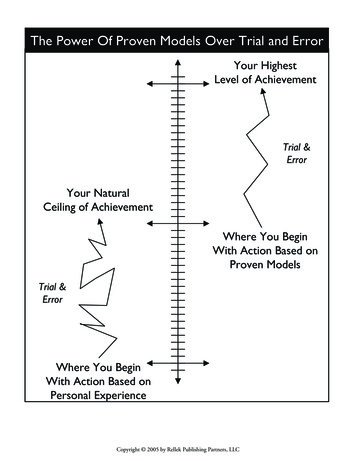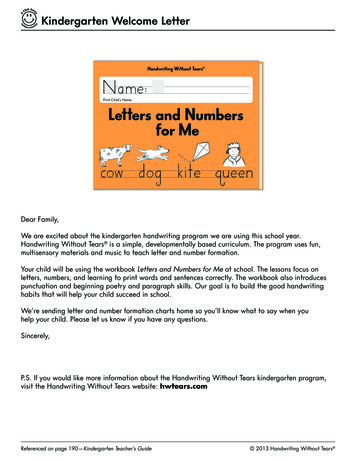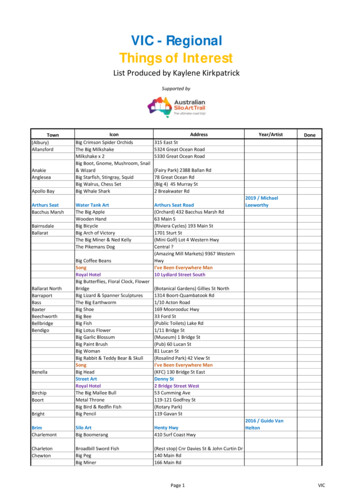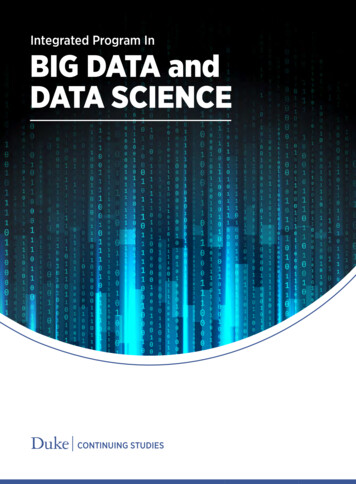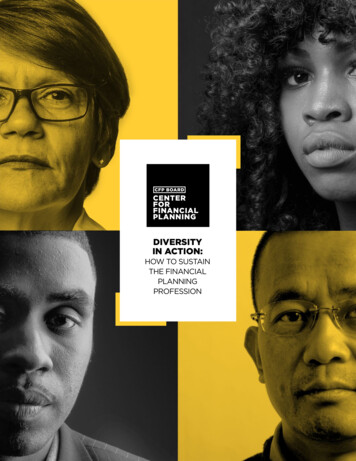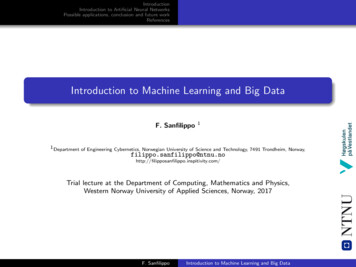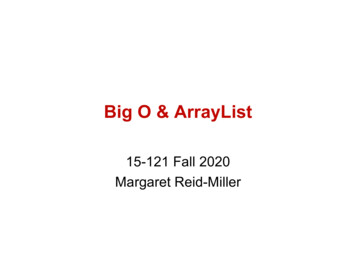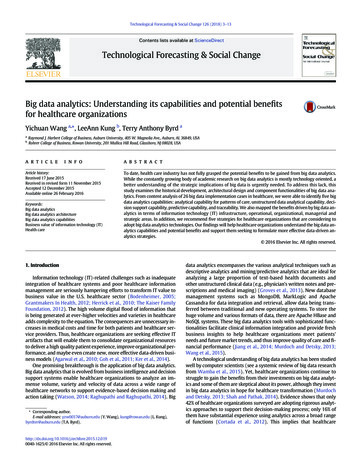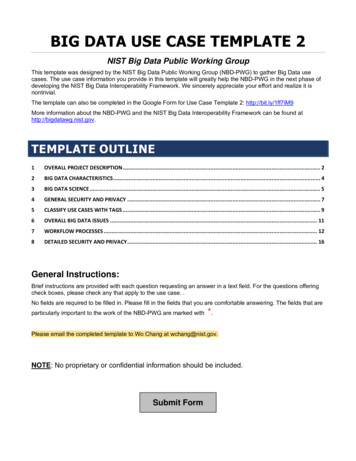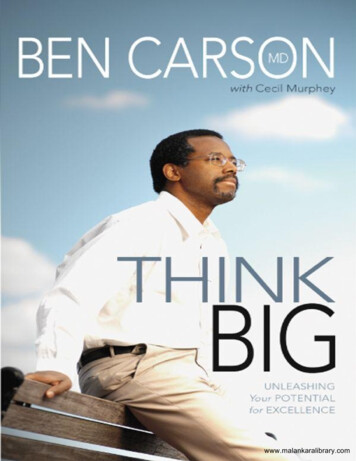
Transcription
www.malankaralibrary.com
www.malankaralibrary.com
Other Books by Ben CarsonGifted Hands (with Cecil Murphey)The Big Picture (with Gregg Lewis)www.malankaralibrary.com
www.malankaralibrary.com
ZODERVANTHINK BIGCopyright 1992 by Benjamin Carson, M.D.All rights reserved under International and Pan-American Copyright Conventions. By payment of therequired fees, you have been granted the non-exclusive, non-transferable right to access and read the text ofthis e-book on-screen. No part of this text may be reproduced, transmitted, down-loaded, decompiled,reverse engineered, or stored in or introduced into any information storage and retrieval system, in any formor by any means, whether electronic or mechanical, now known or hereinafter invented, without the expresswritten permission of Zondervan.ePub Edition July 2009 ISBN: 978-0-310-86048-8Requests for information should be addressed to:Zondervan, Grand Rapids, Michigan 49530Library of Congress Cataloging-in-Publication DataCarson, Ben.Think big : unleashing your potential for excellence / by Ben Carson with Cecil Murphey.p. cm.ISBN-13: 978-0-310-26900-71. Excellence — Religious aspects — Christianity. 2. Success — Religious aspects — Christianity. 3.Christian life — 1960 – 4. Carson, Ben. 5. Christian biography — United States. 6. Neurosurgeons —United States — biography.I. Murphey, Cecil B. II. Title.BV4509.5.C5C37 1992248.4 — dc2091 — 27217All Scripture quotations, unless otherwise indicated, are taken from the Holy Bible: New InternationalVersion . NIV . Copyright 1973, 1978, 1984 by International Bible Society. Used by permission ofZondervan. All rights reserved.All rights reserved. No part of this publication may be reproduced, stored in a retrieval system, ortransmitted in any form or by any means — electronic, mechanical, photocopy, recording, or any other —except for brief quotations in printed reviews, without the prior permission of the publisher.Edited by Mary McCormick07 08 09 10 11 22 21 20 19 18 17 16 15 14 13 12 11 10 9 8www.malankaralibrary.com
To all those individuals behind the sceneswho make it possible for meto practice neurosurgeryand still remain socially active.www.malankaralibrary.com
To shake the treeOf life itself and bring down fruitunheard-of!E. A. Robinsonwww.malankaralibrary.com
ContentsTitle PageCopyrightIntroductionPart 1Giving Their Best and Thinking Big1. Do It Better!2. My Mother, Sonya Carson3. Mentors, Inspirers, and Influencers4. Medical Mentors5. Other Significant People6. Builders for Eternity7. Parents and Patients8. Taking Risks9. Not EnoughPart 2You Can Give Your Best and Think Big10. Thinking Big11. Honesty Shows12. Insightful Thoughtswww.malankaralibrary.com
13. Nice Guys Finish14. Knowledge Counts15. Books Are for Reading16. In-depth Learning17. Caution: God at Work18. Reaching for SuccessAbout the Publisherwww.malankaralibrary.com
IntroductionThe renown that riches or beauty confer is fleeting and frail;mental excellence is a splendid and lasting possession.Sallust (86 – 34 B.C.)This is a book about giving our best and especially about doing whatever we canto help others — about Thinking Big — one of the important concepts of mylife. It might also be called a book about excellence. Or about dedication.It is also a book about people who give their best and who Think Big.I chose this theme because our society tends to focus on super-entertainers,sports figures, politicians, or the highly publicized individuals who dooutstanding work and get recognized for their achievements. I am all forachievement, and just as much in favor of recognition. But what about those whogive their best but never receive recognition? Or financial reward? Or honor? Orfame?My life has been a rich one, having been blessed by God in many ways. Myfirst book, Gifted Hands* has brought me much recognition and has focused thespotlight on me. Consequently, many people have expressed appreciation forwhat I have been trying to do.High school students have written to tell me that the book has challengedthem and changed their lives; dedicated teachers have given out copies to alltheir students; a number of congregations bought copies of Gifted Hands to giveto students; I know of at least two businessmen who each bought more than athousand copies to distribute. And I am grateful.I am pleased to know that my story has encouraged many and thankful forevery word of appreciation, but I also want to point out one of the great truths oflife: I did not do it alone. I had help along the way.Competent, committed individuals gave me their best without reservation.Often I receive the recognition, but now I want to pause long enough to shine thespotlight on them, if only for a moment. They deserve it.www.malankaralibrary.com
Without repeating most of the experiences detailed in Gifted Hands, I want toacknowledge the significant individuals who helped Ben Carson climb from theacademic bottom of his fifth grade class to become, at age thirty-three, head ofpediatric neurosurgery at Johns Hopkins Hospital. One of the youngest personsever to have such a position, I am the only black person to have such a positionat a world-renowned institution. God endowed me with ability, but I would neverhave been cognizant of those gifts, or used them if others had not taken time toshare their talents by giving their best to me.I hope that now you will walk another step further with me. I want to take youthrough my life again and tell you about those special, rare, and gifted peoplewho have made my achievements possible. And who did it often withoutrealizing it, simply by giving their best.* Gifted Hands by Ben Carson with Cecil Murphey (co-published by Review& Herald, Hagerstown, MD, and Zondervan, Grand Rapids, MI) 1990.www.malankaralibrary.com
Part 1Giving Their Bestand Thinking BigThere are loyal hearts, there are spirits brave,There are souls that are pure and true;Then give the world the best you have,And the best will come back to you.Madeline Bridgeswww.malankaralibrary.com
CHAPTER 1Do It Better!It is chiefly through books that we enjoy intercourse with superior minds. In the best books, greatmen talk to us, give us their most precious thoughts, and pour their souls into ours. God be thankedfor books. They are the voices of the distant and the dead, and make us heirs of the spiritual life ofpast ages. Books are true levelers. They give to all who will faithfully use them, the society, thespiritual presence, of the best and greatest of our race.William Ellery ChanningBenjamin, is this your report card?” my mother asked as she picked up thefolded white card from the table.“Uh, yeah,” I said, trying to sound casual. Too ashamed to hand it to her, I haddropped it on the table, hoping that she wouldn’t notice until after I went to bed.It was the first report card I had received from Higgins Elementary Schoolsince we had moved back from Boston to Detroit, only a few months earlier.I had been in the fifth grade not even two weeks before everyone consideredme the dumbest kid in the class and frequently made jokes about me. Beforelong I too began to feel as though I really was the most stupid kid in fifth grade.Despite Mother’s frequently saying, “You’re smart, Bennie. You can do anythingyou want to do,” I did not believe her.No one else in school thought I was smart, either.Now, as Mother examined my report card, she asked, “What’s this grade inreading?” (Her tone of voice told me that I was in trouble.) Although I wasembarrassed, I did not think too much about it. Mother knew that I wasn’t doingwell in math, but she did not know I was doing so poorly in every subject.While she slowly read my report card, reading everything one word at a time,I hurried into my room and started to get ready for bed. A few minutes later,Mother came into my bedroom.www.malankaralibrary.com
“Benjamin,” she said, “are these your grades?” She held the card in front ofme as if I hadn’t seen it before.“Oh, yeah, but you know, it doesn’t mean much.”“No, that’s not true, Bennie. It means a lot.”“Just a report card.”“But it’s more than that.”Knowing I was in for it now, I prepared to listen, yet I was not all thatinterested. I did not like school very much and there was no reason why I should.Inasmuch as I was the dumbest kid in the class, what did I have to look forwardto? The others laughed at me and made jokes about me every day.“Education is the only way you’re ever going to escape poverty,” she said.“It’s the only way you’re ever going to get ahead in life and be successful. Doyou understand that?”“Yes, Mother,” I mumbled.“If you keep on getting these kinds of grades you’re going to spend the rest ofyour life on skid row, or at best sweeping floors in a factory. That’s not the kindof life that I want for you. That’s not the kind of life that God wants for you.”I hung my head, genuinely ashamed. My mother had been raising me and myolder brother, Curtis, by herself. Having only a third-grade education herself, sheknew the value of what she did not have. Daily she drummed into Curtis and methat we had to do our best in school.“You’re just not living up to your potential,” she said. “I’ve got two mightysmart boys and I know they can do better.”I had done my best — at least I had when I first started at Higgins ElementarySchool. How could I do much when I did not understand anything going on inour class?In Boston we had attended a parochial school, but I hadn’t learned much becauseof a teacher who seemed more interested in talking to another female teacherwww.malankaralibrary.com
than in teaching us. Possibly, this teacher was not solely to blame — perhaps Iwasn’t emotionally able to learn much. My parents had separated just before wewent to Boston, when I was eight years old. I loved both my mother and fatherand went through considerable trauma over their separating. For monthsafterward, I kept thinking that my parents would get back together, that mydaddy would come home again the way he used to, and that we could be thesame old family again — but he never came back. Consequently, we moved toBoston and lived with Aunt Jean and Uncle William Avery in a tenementbuilding for two years until Mother had saved enough money to bring us back toDetroit.Mother kept shaking the report card at me as she sat on the side of my bed. “Youhave to work harder. You have to use that good brain that God gave you, Bennie.Do you understand that?”“Yes, Mother.” Each time she paused, I would dutifully say those words.“I work among rich people, people who are educated,” she said. “I watch howthey act, and I know they can do anything they want to do. And so can you.” Sheput her arm on my shoulder. “Bennie, you can do anything they can do — onlyyou can do it better!”Mother had said those words before. Often. At the time, they did not mean muchto me. Why should they? I really believed that I was the dumbest kid in fifthgrade, but of course, I never told her that.“I just don’t know what to do about you boys,” she said.“I’m going to talk to God about you and Curtis.” She paused, stared intospace, then said (more to herself than to me), “I need the Lord’s guidance onwhat to do. You just can’t bring in any more report cards like this.”As far as I was concerned, the report card matter was over.The next day was like the previous ones — just another bad day in school,another day of being laughed at because I did not get a single problem right inarithmetic and couldn’t get any words right on the spelling test. As soon as Icame home from school, I changed into play clothes and ran outside. Most of theboys my age played softball, or the game I liked best, “Tip the Top.”www.malankaralibrary.com
We played Tip the Top by placing a bottle cap on one of the sidewalk cracks.Then taking a ball — any kind that bounced — we’d stand on a line and taketurns throwing the ball at the bottle top, trying to flip it over. Whoever succeededgot two points. If anyone actually moved the cap more than a few inches, he wonfive points. Ten points came if he flipped it into the air and it landed on the otherside.When it grew dark or we got tired, Curtis and I would finally go inside andwatch TV. The set stayed on until we went to bed. Because Mother worked longhours, she was never home until just before we went to bed. Sometimes I wouldawaken when I heard her unlocking the door.Two evenings after the incident with the report card, Mother came home aboutan hour before our bedtime. Curtis and I were sprawled out, watching TV. Shewalked across the room, snapped off the set, and faced both of us. “Boys,” shesaid, “you’re wasting too much of your time in front of that television. You don’tget an education from staring at television all the time.”Before either of us could make a protest, she told us that she had been prayingfor wisdom. “The Lord’s told me what to do,” she said. “So from now on, youwill not watch television, except for two preselected programs each week.”“Just two programs?” I could hardly believe she would say such a terriblething. “That’s not — ”“And only after you’ve done your homework. Furthermore, you don’t playoutside after school, either, until you’ve done all your homework.”“Everybody else plays outside right after school,” I said, unable to think ofanything except how bad it would be if I couldn’t play with my friends. “I won’thave any friends if I stay in the house all the time — ”“That may be,” Mother said, “but everybody else is not going to be assuccessful as you are — ”“But, Mother — ”“This is what we’re going to do. I asked God for wisdom, and this is theanswer I got.”www.malankaralibrary.com
I tried to offer several other arguments, but Mother was firm. I glanced atCurtis, expecting him to speak up, but he did not say anything. He lay on thefloor, staring at his feet.“Don’t worry about everybody else. The whole world is full of ‘everybodyelse,’ you know that? But only a few make a significant achievement.”The loss of TV and play time was bad enough. I got up off the floor, feeling asif everything was against me. Mother wasn’t going to let me play with myfriends, and there would be no more television — almost none, anyway. She wasstopping me from having any fun in life.“And that isn’t all,” she said. “Come back, Bennie.”I turned around, wondering what else there could be.“In addition,” she said, “to doing your homework, you have to read two booksfrom the library each week. Every single week.”“Two books? Two?” Even though I was in fifth grade, I had never read awhole book in my life.“Yes, two. When you finish reading them, you must write me a book reportjust like you do at school. You’re not living up to your potential, so I’m going tosee that you do.”Usually Curtis, who was two years older, was the more rebellious. But thistime he seemed to grasp the wisdom of what Mother said. He did not say oneword.She stared at Curtis. “You understand?”He nodded.“Bennie, is it clear?”“Yes, Mother.” I agreed to do what Mother told me — it wouldn’t haveoccurred to me not to obey — but I did not like it. Mother was being unfair anddemanding more of us than other parents did.www.malankaralibrary.com
The following day was Thursday. After school, Curtis and I walked to the localbranch of the library. I did not like it much, but then I had not spent that muchtime in any library.We both wandered around a little in the children’s section, not having any ideaabout how to select books or which books we wanted to check out.The librarian came over to us and asked if she could help.We explained that both of us wanted to check out two books.“What kind of books would you like to read?” the librarian asked.“Animals,” I said after thinking about it. “Something about animals.”“I’m sure we have several that you’d like.” She led me over to a section ofbooks. She left me and guided Curtis to another section of the room. I flippedthrough the row of books until I found two that looked easy enough for me toread. One of them, Chip, the Dam Builder — about a beaver — was the first oneI had ever checked out. As soon as I got home, I started to read it. It was the firstbook I ever read all the way through even though it took me two nights.Reluctantly I admitted afterward to Mother that I really had liked reading aboutChip.Within a month I could find my way around the children’s section likesomeone who had gone there all his life. By then the library staff knew Curtisand me and the kind of books we chose. They often made suggestions. “Here’s adelightful book about a squirrel,” I remember one of them telling me.As she told me part of the story, I tried to appear indifferent, but as soon as shehanded it to me, I opened the book and started to read.Best of all, we became favorites of the librarians. When new books came inthat they thought either of us would enjoy, they held them for us. Soon I becamefascinated as I realized that the library had so many books — and about so manydifferent subjects.After the book about the beaver, I chose others about animals — all types ofanimals. I read every animal story I could get my hands on. I read books aboutwolves, wild dogs, several about squirrels, and a variety of animals that lived inwww.malankaralibrary.com
other countries. Once I had gone through the animal books, I started readingabout plants, then minerals, and finally rocks.My reading books about rocks was the first time the information ever becamepractical to me. We lived near the railroad tracks, and when Curtis and I took theroute to school that crossed by the tracks, I began paying attention to the crushedrock that I noticed between the ties.As I continued to read more about rocks, I would walk along the tracks,searching for different kinds of stones, and then see if I could identify them.Often I would take a book with me to make sure that I had labeled each stonecorrectly.“Agate,” I said as I threw the stone. Curtis got tired of my picking up stonesand identifying them, but I did not care because I kept finding new stones all thetime. Soon it became my favorite game to walk along the tracks and identify thevarieties of stones. Although I did not realize it, within a very short period oftime, I was actually becoming an expert on rocks.The world of books is the most remarkable creation of man; nothing else that he builds ever lasts.Monuments fall; nations perish; civilizations grow old and die out. After an era of darkness, newraces build others; but in the world of books are volumes that live on still as young and fresh as theday they were written, still telling men’s hearts of the hearts of men centuries dead.— Clarence DayTwo things happened in the second half of fifth grade that convinced me ofthe importance of reading books.First, our teacher, Mrs. Williamson, had a spelling bee every Friday afternoon.We’d go through all the words we’d had so far that year. Sometimes she alsocalled out words that we were supposed to have learned in fourth grade. Withoutfail, I always went down on the first word.One Friday, though, Bobby Farmer, whom everyone acknowledged as thesmartest kid in our class, had to spell “agriculture” as his final word. As soon asthe teacher pronounced his word, I thought, I can spell that word. Just the daybefore, I had learned it from reading one of my library books. I spelled it undermy breath, and it was just the way Bobby spelled it.If I can spell “agriculture,” I’ll bet I can learn to spell any other word in thewww.malankaralibrary.com
world. I’ll bet I can learn to spell better than Bobby Farmer.Just that single word, “agriculture,” was enough to give me hope.The following week, a second thing happened that forever changed my life.When Mr. Jaeck, the science teacher, was teaching us about volcanoes, he heldup an object that looked like a piece of black, glass-like rock. “Does anybodyknow what this is? What does it have to do with volcanoes?”Immediately, because of my reading, I recognized the stone. I waited, butnone of my classmates raised their hands. I thought, This is strange. Not even thesmart kids are raising their hands. I raised my hand.“Yes, Benjamin,” he said.I heard snickers around me. The other kids probably thought it was a joke, orthat I was going to say something stupid.“Obsidian,” I said.“That’s right!” He tried not to look startled, but it was obvious he hadn’texpected me to give the correct answer.“That’s obsidian,” I said, “and it’s formed by the supercool-ing of lava when ithits the water.” Once I had their attention and realized I knew information noother student had learned, I began to tell them everything I knew about thesubject of obsidian, lava, lava flow, supercooling, and compacting of theelements.When I finally paused, a voice behind me whispered, “Is that Bennie Carson?”“You’re absolutely correct,” Mr. Jaeck said and he smiled at me. If he hadannounced that I’d won a million-dollar lottery, I couldn’t have been morepleased and excited.“Benjamin, that’s absolutely, absolutely right,” he repeated with enthusiasm inhis voice. He turned to the others and said, “That is wonderful! Class, this is atremendous piece of information Benjamin has just given us. I’m very proud tohear him say this.”www.malankaralibrary.com
For a few moments, I tasted the thrill of achievement. I recall thinking, Wow,look at them. They’re all looking at me with admiration. Me, the dummy! Theone everybody thinks is stupid. They’re looking at me to see if this is really mespeaking.Maybe, though, it was I who was the most astonished one in the class.Although I had been reading two books a week because Mother told me to, I hadnot realized how much knowledge I was accumulating. True, I had learned toenjoy reading, but until then I hadn’t realized how it connected with myschoolwork. That day — for the first time — I realized that Mother had beenright. Reading is the way out of ignorance, and the road to achievement. I did nothave to be the class dummy anymore.For the next few days, I felt like a hero at school. The jokes about me stopped.The kids started to listen to me. I’m starting to have fun with this stuff.As my grades improved in every subject, I asked myself, “Ben, is there anyreason you can’t be the smartest kid in the class? If you can learn about obsidian,you can learn about social studies and geography and math and science andeverything.”That single moment of triumph pushed me to want to read more. From thenon, it was as though I could not read enough books. Whenever anyone looked forme after school, they could usually find me in my bedroom — curled up, readinga library book — for a long time, the only thing I wanted to do. I had stoppedcaring about the TV programs I was missing; I no longer cared about playing Tipthe Top or baseball anymore. I just wanted to read.In a year and a half — by the middle of sixth grade — I had moved to the topof the class. Unfortunately, I had not been content just to read and to learn. I alsofelt I had to let everyone else in the world know how brilliant I had become. Atthe time, I honestly believed that I knew more than any of the other kids in myclassroom. I thought I was brilliant; actually, I was quite obnoxious.This important fact did not start getting through to me until I was in the ninthgrade. One day I asked one of my classmates, who had never treated me well nomatter how hard I tried to be friendly, “Why are you so hostile? Why do you hateme?”“Because you’re obnoxious,” he said. “Because you know so much and youwww.malankaralibrary.com
want to make sure everybody knows it.”I don’t know if I answered or just walked away, but I never forgot his words.In fifth grade, everyone had laughed at me when I did not know anything; nowthey hated me because I acted as if I knew everything.Until that moment, because knowledge was new and wonderful and exciting, Ithought everybody wanted to hear about everything new that I learned. I had notrealized how overbearing I had become. My classmate’s cutting words made meaware of how wrong I had been.The remark did not cure me, but it did force me to admit that I needed tochange my attitude. And I did — slowly. Unfortunately, it took a few moreexperiences before the message really got through.Once I became known as Ben Carson, the brightest student in his class, Ispouted off answers at every opportunity. More than just answers, when anysubject came up, I started telling an individual or a group more than anybodyever wanted to know about the topic.As I later realized, part of the issue involved getting back at those who hadlaughed at me in fifth grade. They had called me stupid and dumb, but I keptproving again and again that they were wrong. By then they were convinced, butI kept on. It was immature of me and mistaken, but that’s what I did anyway.The boy who never got any answers right on a test in math had totallyreversed everything by the time he took advanced algebra. We had a midtermtest and the teacher added two extra-credit questions. When she passed back theexams, I saw that one of the smartest boys in the class had made a 91. After classI went up to him and asked, “Hi, what did you make on the test?”“I made 91.”Momentarily I waited for him to ask, “What did you get?” When he did notask, I volunteered, “I got 110 — everything right and the two bonus questionstoo.”“Oh, yeah. That so?” he said and started to walk off.“Well, maybe you’ll do better next time,” I said.www.malankaralibrary.com
“Yeah,” he answered without turning around.“If you need any help, let me know!”He did not acknowledge that he had heard me.By eleventh grade I had gotten so caught up in achievement-just- forachievement’s sake that it must have been awful for others to be around me.Then, in one of my chemistry exams, I made only a 99, which was an A — buttwo others got a 100.No one said anything to me, but I was sure that those other two must havebeen gloating. They had bettered my grade, which no one had done for at leastfour years.Somehow I had convinced myself that I had to be the best and brighteststudent in the entire high school. When someone did something better — and itwas inevitable that it had to happen at least part of the time — it made me thinkthat I was not the best, after all. And if I were not the best, then as far as I wasconcerned, I had failed.I really blew that test, I told myself over and over. If I had just studied a littleharder, or maybe taken a little more time in thinking through the answers, Iwould have made 100. For the rest of the day, I felt like a terrible, terrible failure.Too vividly I remembered fifth grade and the way some of the kids had treatedme.“I’ll never fail again,” I promised myself, still not having figured out that somuch of this revolved around my attitude.Then an incident occurred that did more than get my atten-tion: It made mesee myself the way others were seeing me.In the eleventh grade, our entire class took a field trip to the Detroit HistoricalMuseum. At one point, we were examining pictures of Detroit in 1890. Standingnext to Anthony Flowers, I whispered, “Wouldn’t it have been great to live backthere in those days and to know as much as I know now, because then I could besmarter than anybody else?”www.malankaralibrary.com
“But you’re already smarter than everybody else,” Anthony said, “so whywould you want to do that?”“Just for fun,” I said. But to myself I asked, Why would I want to do that?Why do I have to prove that I am smarter than anyone else?Anthony’s simple question forced me to take an intense look at BenjaminCarson. It was a moment of clear revelation when I realized how apparent itmust be to everybody that I was always trying to be the smartest person in thecrowd. They did not appreciate the constant information that I tried to give them.None of them seemed to like me any better when they discovered that I wassmart — in fact, maybe some liked me less.Then another thought hit me: Maybe that’s not the way I should be. What if Itry to be confident in what I’m doing and not make it so obvious that I have to bethe best? If I know all of this and use it, isn’t that what counts? Who said that Ihave to push all this information on everybody?From then on I did change, because I perceived my need to be different.In retrospect, as I analyze the intellectual monster I had become to a degree, itevolved because I felt pushed. Mother kept reminding me, saying nearly everyday something like, “You should be the best.” That idea had become ingrained inme. Yet, she had not intended for me to boast or feel smarter, nor had she meantthat I was to haul out my knowledge and display it ad nauseam.It took a long time to overcome that need to be better than everybody else.Finally, I grasped that Mother had been trying to get me to understand simplythat I had to do my best — just my best — and that my doing my best was allshe wanted or that anyone could expect. She even said those very words manytimes, but it still took a long time for it all to come together.The best turn of events that helped me get all this in perspective came aboutwhen I entered Yale University. Until then I had honestly believed that I wassmarter than anyone else. Then I met other students (some in the geniuscategory) who had been at the top of their class in high school, who had muchwider knowledge than I, and who knew how to study in-depth. I felt outclassed.Being around those talented students forced me to make significantreadjustments in my thinking about my ability. For a few weeks I experiencedwww.malankaralibrary.com
the emotions of fifth grade all over again. I did intensive soul-searching andpraying. This introspection made me realize that I was smart, yes, but notsmarter than everybody else. There was no reason that I should expect to besmarter than everybody else. If I were going to achieve goals, I was going tohave to work for them just as everybody else does. I was not an innate genius.M
Think big : unleashing your potential for excellence / by Ben Carson with Cecil Murphey. p. cm. ISBN-13: 978--310-26900-7 1. Excellence — Religious aspects — Christianity. . mental excellence is a splendid and lasting possession. Sallust (86 - 34 B.C.) This is a book about giving our best and especially about doing whatever we can
